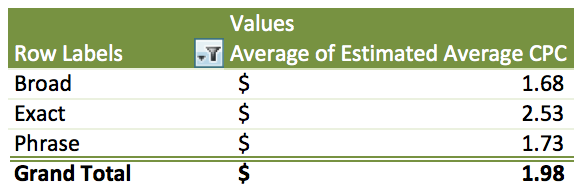If you were to ask a PPC specialist which metrics are most important, most of them probably would not list cost-per-click (CPC) as one of them. While it usually isn’t something that is optimized in PPC accounts, it’s definitely something we should be aware of. This article will walk through the basics of the average CPC metric.
Setting Initial Bids
When you upload new keywords into your account, how do you know how high or low to set your bids? One tool you can use is Google’s Keyword Planner. All you have to do is type in your potential keywords and Google spits out a suggested bid and an estimated average CPC. Below is an example of estimated CPCs by match type. It’s important to note that these are estimations, and should be taken with a grain of salt.
Another way you can set initial bids is to take a look at existing bids and CPCs for similar keywords. I like to set the bids for the new keywords a bit higher than existing bids, just so they have a better shot at a decent average position starting off. You can always adjust bids after your keywords have been running for a couple days or so.
What Impacts Cost-Per-Click?
There are a number of things that can affect the amount you are paying for each click. The first, and possibly most transparent, is the bid you have set. The higher the bid, the more you are willing to pay for each click.
Another metric that can affect average CPC is quality score. The better your quality score is for each keyword the less you will end up paying.
Match type can also affect average CPCs, with modified broad match typically having lower CPCs than phrase and exact. Below is a table of CPC vs. average position for an account. We see that exact match has a lower CPC than phrase, but a better average position, most likely due to higher quality scores.
Competition can also affect average CPCs along with many other aspects of your PPC campaigns. If you are in a highly competitive vertical, it’s likely that your CPCs will be much higher than if there’s no (or little) competition, as advertisers are setting high bids to appear at the top of the SERP.
Adjusting Cost-Per-Clicks
Now that you’ve done your research and set initial bids, now comes the optimization part. First we’ll talk about what your ideal CPC is. The answer here, like many PPC questions, is it depends. In a more general sense, your ideal cost-per-click is enough to get you to an average position that will bring in affordable conversions.
As far as optimizing cost-per-click, you can either adjust manually or automatically. This article goes through some different bidding methods, but the basic concept is you want to increase bids on keywords that are performing well, and decrease bids on underperforming keywords. You can do your bid adjustments based on cost-per-lead, conversion volume, ROAS, average position, or whatever metric you deem important.
In addition to regular bid changes you can also set bid adjustments based on hour of day, geographic location, and mobile device. These types of bid adjustments allow you to always bid down (or up) during times when performance is typically good.
The example above illustrates how different CPCs can be throughout the day. All three highlighted hours of the day have similar average positions, however the 11 o’clock hour has the cheapest CPC, and the highest number of conversions.
Remember to not only take CPCs into account when adjusting bids, as a higher CPC keyword might be bringing in much more revenue with a higher ROAS than a cheaper keyword. In this instance, it’s probably worth it to pay more for the click.
Conclusion
Average cost-per-click is an easy metric to calculate and manipulate, and is important for doing bid changes. Make sure that you are paying attention to this metric in addition to your primary goals.






